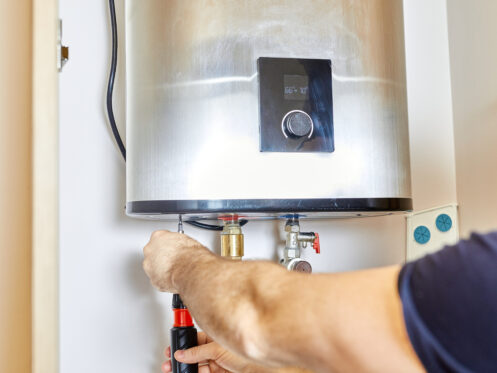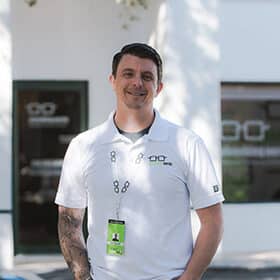Did you know switching to a tankless water heater can save up to 34% on energy costs in homes with low hot water usage? If your home in Cape Coral, FL, relies on a traditional storage-tank water heater, it might be time to consider upgrading. Tankless water heaters provide endless hot water, increased energy efficiency, and longer lifespans. Here’s everything you need to know about making the switch.
What Is a Tankless Water Heater?
Tankless water heaters, also known as instantaneous or on-demand water heaters, are precisely what their name suggests. They’re a hot water system that doesn’t store hot water for future use. Instead, they sense your demand for hot water and produce it on the fly as needed.
Tankless water heaters have been around for nearly a century, but modern advancements make them more efficient and cost-effective than ever. However, tankless water heaters initially struggled due to their comparatively high costs and relative inefficiency.
That didn’t change until the 1970s when advances in materials and technology finally made tankless heaters the more efficient option. Tankless heaters took off in Europe and much of the developed world in the following years. However, they didn’t gain significant market share in the U.S. until the 1990s.
How Do Tankless Water Heaters Work?
Today, there are two main types of tankless water heaters. You can choose an electric model or a gas-fired model. The latter is the more efficient option, but both function similarly. The only difference is the heating element used to produce hot water. In an electric, a high-wattage electric resistance heating element does the work. In a gas-fired model, you’ll find a heating element similar to the gas burners in a furnace.
All tankless water heaters contain a flow sensor that detects hot water demand. When you turn on a hot water tap in your home, the sensor automatically activates the system’s heating element. The heating element transfers heat to incoming water using a heat exchanger device. It’s essentially a pipe loop surrounded by metal fins. Some high-efficiency gas tankless models feature a secondary heat exchanger to extract more heat from exhaust gasses.
The Advantages of Tankless Water Heaters
There are various advantages to switching to a tankless water heater. For one, they offer an endless supply of hot water. There’s no stored hot water that can run out while you’re using it. Tankless heaters are also significantly more energy efficient than storage tanks. In homes with low hot water usage, a tankless water heater might save up to 34% on energy costs. In a high-usage home, it’s less advantageous but can still save up to 14%. Plus, tankless water heaters last up to 20 years, roughly double a storage tank’s lifespan.
The Disadvantages of Tankless Water Heaters
Tankless water heaters aren’t a perfect solution and have some notable drawbacks. One of them is limited flow rates. Although they produce hot water for as long as you need it, they’re volume-limited. If you try using hot water in multiple places simultaneously, your tankless might not keep up. They’re also more expensive than comparable storage tank models. You may also need a water softener to protect your tankless if your home has hard water.
What to Consider When Switching to a Tankless Water Heater
When you replace a storage tank water heater with a similar model, storage capacity is your only primary concern. However, if you’re switching to a tankless, you’ll have a few more things to consider. Here’s what they are.
Determining Capacity Requirements
Some math is required to determine what size tankless you need to replace your storage tank. There are two factors to consider. One is the maximum hot water flow rate you require from your system. To figure that out, add the flow rates of all hot water fixtures and appliances you wish to use simultaneously. Here are some average flow rates to get you started:
- Kitchen sink – 1.5 GPM
- Dishwasher – 1.5 GPM
- Washing machine – 2 GPM
- Shower – 2.5 GPM
- Tub – 4 GPM
You can accurately measure the flow rate of your fixtures with a gallon-sized container and a stopwatch. Simply time how long it takes for the fixture to fill the container to the top. Divide the result by 60, and you’ll calculate the flow rate in gallons per minute.
The second factor you must consider is the temperature rise you require. To figure that out, you must measure the temperature of your home’s incoming water supply. It’s best to do this in the winter when water temperatures reach their lowest point. Here in Cape Coral, however, water temperatures don’t fluctuate too much with the seasons.
You’ll find that the average water temperature here is around 71 degrees. Once you have your temperature reading, subtract it from how hot you want your water. Most storage tanks come preset to 120 degrees. Using that as a baseline, you’d need a tankless capable of an approximate 50-degree temperature rise.
Necessary Infrastructure Modifications
Another thing you must consider when switching to a tankless is its unique plumbing needs. Tankless heaters are wall-mounted, so you must alter your plumbing to install one. Some tankless models feature water inlet and outlet layouts that mimic storage tanks. That can reduce how much plumbing work you’ll need during your installation.
Assuming you use a gas-fired model, you will also require alterations to your water heater’s ventilation system and gas lines. If you’re installing an electric model, you’ll likely need a new high-amperage circuit installed to power it.
Maintenance Requirements
Finally, you’ll need to adjust to some new maintenance requirements for your tankless. If you have a gas-fired model, it will need periodic air intake filter cleanings. Your unit may also have a water inlet filter or screen that requires occasional cleaning.
Tankless water heaters also need yearly flushing to remove scale and keep the unit functioning efficiently. Most tankless manufacturers recommend vinegar as a flushing agent because it’s gentle on your pipes and isn’t toxic to humans.
In general, it’s best to let a professional plumber perform the required maintenance on your tankless unit. They’ll know how to safely work around your system’s heating element and minimize the danger of working with hot water. Additionally, professional maintenance will help you satisfy your system’s warranty requirements.
Local Tankless Water Heater Experts
For over 15 years, Plumbing, Cooling & Electrical Nerds has offered Cape Coral homeowners the latest water heater options. We pride ourselves on providing timely and affordable plumbing services with fast turnarounds. We offer complete plumbing services, HVAC services, indoor air quality services, and more.
We’re a Rheem Pro Plumber, a Nextdoor Neighborhood Fave, and a multi-year Angi Super Service award recipient. We’re also Better Business Bureau accredited with an A+ rating. So, if you want to switch to a tankless water heater in Cape Coral, call the experts at Plumbing, Cooling & Electrical Nerds today!

